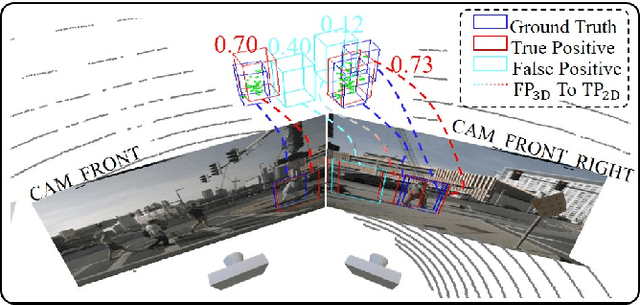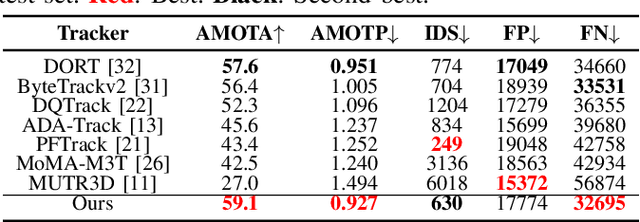Yitao Wu
Rethinking the Spatio-Temporal Alignment of End-to-End 3D Perception
Dec 29, 2025Abstract:Spatio-temporal alignment is crucial for temporal modeling of end-to-end (E2E) perception in autonomous driving (AD), providing valuable structural and textural prior information. Existing methods typically rely on the attention mechanism to align objects across frames, simplifying the motion model with a unified explicit physical model (constant velocity, etc.). These approaches prefer semantic features for implicit alignment, challenging the importance of explicit motion modeling in the traditional perception paradigm. However, variations in motion states and object features across categories and frames render this alignment suboptimal. To address this, we propose HAT, a spatio-temporal alignment module that allows each object to adaptively decode the optimal alignment proposal from multiple hypotheses without direct supervision. Specifically, HAT first utilizes multiple explicit motion models to generate spatial anchors and motion-aware feature proposals for historical instances. It then performs multi-hypothesis decoding by incorporating semantic and motion cues embedded in cached object queries, ultimately providing the optimal alignment proposal for the target frame. On nuScenes, HAT consistently improves 3D temporal detectors and trackers across diverse baselines. It achieves state-of-the-art tracking results with 46.0% AMOTA on the test set when paired with the DETR3D detector. In an object-centric E2E AD method, HAT enhances perception accuracy (+1.3% mAP, +3.1% AMOTA) and reduces the collision rate by 32%. When semantics are corrupted (nuScenes-C), the enhancement of motion modeling by HAT enables more robust perception and planning in the E2E AD.
RockTrack: A 3D Robust Multi-Camera-Ken Multi-Object Tracking Framework
Sep 18, 2024



Abstract:3D Multi-Object Tracking (MOT) obtains significant performance improvements with the rapid advancements in 3D object detection, particularly in cost-effective multi-camera setups. However, the prevalent end-to-end training approach for multi-camera trackers results in detector-specific models, limiting their versatility. Moreover, current generic trackers overlook the unique features of multi-camera detectors, i.e., the unreliability of motion observations and the feasibility of visual information. To address these challenges, we propose RockTrack, a 3D MOT method for multi-camera detectors. Following the Tracking-By-Detection framework, RockTrack is compatible with various off-the-shelf detectors. RockTrack incorporates a confidence-guided preprocessing module to extract reliable motion and image observations from distinct representation spaces from a single detector. These observations are then fused in an association module that leverages geometric and appearance cues to minimize mismatches. The resulting matches are propagated through a staged estimation process, forming the basis for heuristic noise modeling. Additionally, we introduce a novel appearance similarity metric for explicitly characterizing object affinities in multi-camera settings. RockTrack achieves state-of-the-art performance on the nuScenes vision-only tracking leaderboard with 59.1% AMOTA while demonstrating impressive computational efficiency.
Fast-Poly: A Fast Polyhedral Framework For 3D Multi-Object Tracking
Mar 20, 2024



Abstract:3D Multi-Object Tracking (MOT) captures stable and comprehensive motion states of surrounding obstacles, essential for robotic perception. However, current 3D trackers face issues with accuracy and latency consistency. In this paper, we propose Fast-Poly, a fast and effective filter-based method for 3D MOT. Building upon our previous work Poly-MOT, Fast-Poly addresses object rotational anisotropy in 3D space, enhances local computation densification, and leverages parallelization technique, improving inference speed and precision. Fast-Poly is extensively tested on two large-scale tracking benchmarks with Python implementation. On the nuScenes dataset, Fast-Poly achieves new state-of-the-art performance with 75.8% AMOTA among all methods and can run at 34.2 FPS on a personal CPU. On the Waymo dataset, Fast-Poly exhibits competitive accuracy with 63.6% MOTA and impressive inference speed (35.5 FPS). The source code is publicly available at https://github.com/lixiaoyu2000/FastPoly.
 Add to Chrome
Add to Chrome Add to Firefox
Add to Firefox Add to Edge
Add to Edge